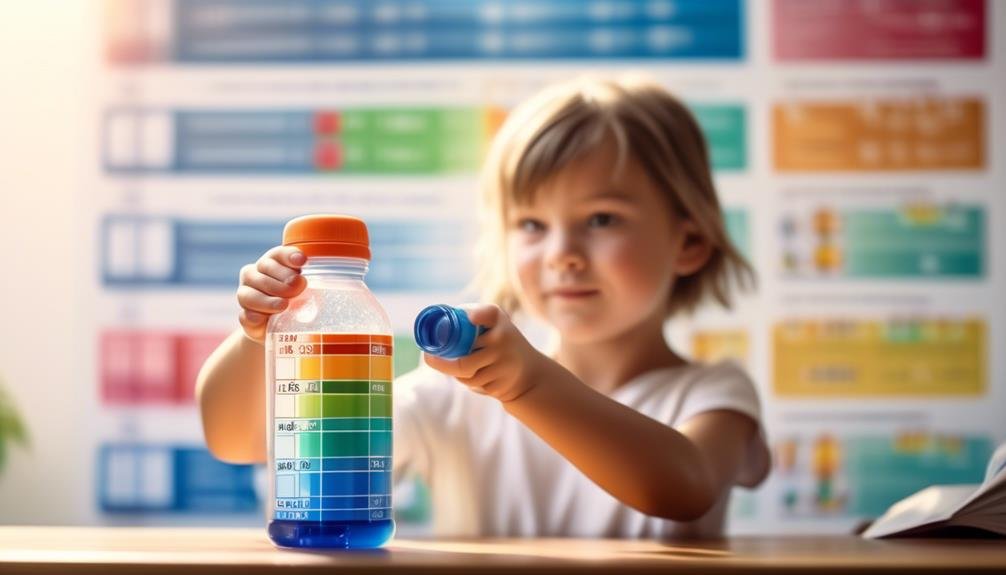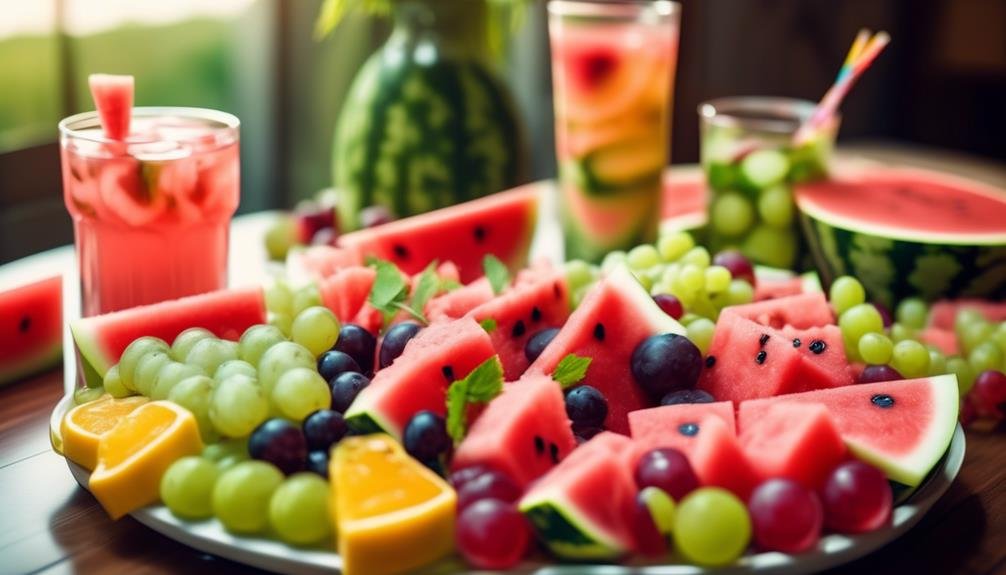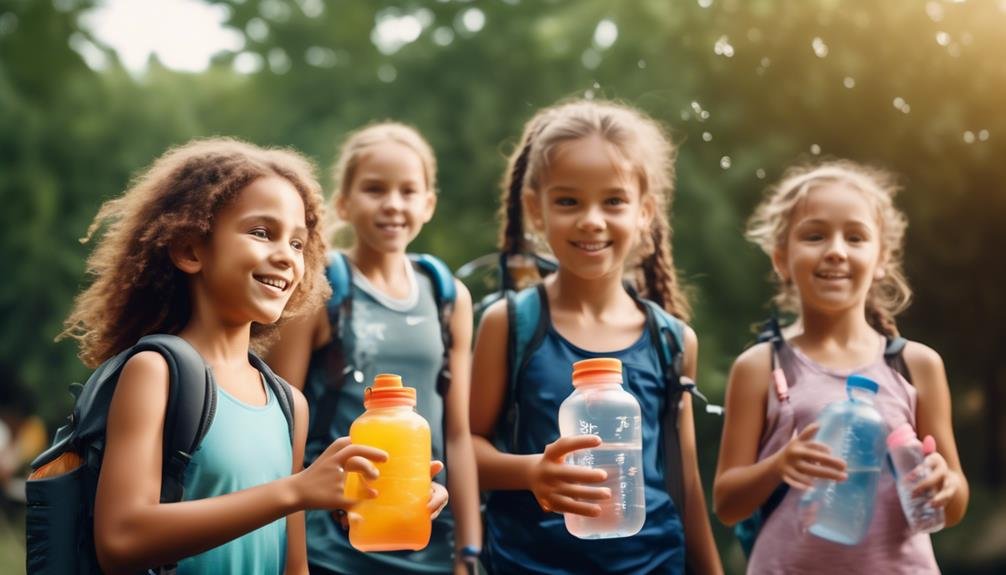"Cherishing Little Steps - A Haven for Baby and Family Journeys"
Hydration for Young Children
Imagine a child running through a scorching desert, their tiny feet sinking into the hot sand with each step. As they brave the relentless sun, their body slowly starts to give in to the heat, desperately craving relief.
Just like this child, the young ones in our lives also need a constant supply of hydration to thrive. But how do we ensure that they're getting enough fluids?
Well, buckle up because we're about to uncover the secrets to keeping your little ones hydrated and healthy.
Key Takeaways
- Proper hydration is essential for young children's overall health and optimal body functioning.
- Water should be the main source of hydration for children, with recommended daily fluid intake of 4 cups (32 ounces) for ages 1-3 and 5 cups (40 ounces) for ages 4-8.
- Encouraging water consumption can be done through hydration games, DIY flavored water, fun water bottles, water drinking charts, and leading by example.
- Hydrating foods, such as watermelon, cucumber, strawberries, and yogurt, provide essential nutrients and help prevent dehydration.
Importance of Hydration for Kids

Staying hydrated is crucial for your child's well-being. Proper hydration ensures optimal functioning of their bodies and promotes overall health. Water is the best choice for keeping your child hydrated as it has numerous benefits.
Firstly, drinking water helps maintain the balance of body fluids. It aids in digestion, absorption, circulation, and transportation of nutrients throughout the body. Water also helps regulate body temperature, especially during physical activities or in hot weather.
Furthermore, staying hydrated promotes cognitive function in children. Research suggests that even mild dehydration can impair cognitive performance, attention, and memory. By encouraging your child to drink enough water, you can support their concentration and learning abilities.
Drinking water also plays a vital role in preventing constipation. Sufficient water intake helps soften the stool, making it easier to pass. This can help alleviate discomfort and promote regular bowel movements in your child.
Lastly, water is a calorie-free beverage, making it an ideal choice to prevent excessive calorie intake and promote healthy weight management in children.
Signs of Dehydration in Children
Dehydration in children can have serious consequences for their health and well-being. It's crucial to be aware of the signs of dehydration in order to prevent further complications.
Mild dehydration can occur when a child's body loses more fluid than it takes in. Some common symptoms of mild dehydration to look out for include thirst, dry or sticky mouth, fatigue, decreased urine output, and dark yellow urine. You may also notice that your child is irritable or has a decreased appetite.
Paying attention to these signs can help you identify dehydration early on and take necessary steps to prevent it from worsening. Encouraging your child to drink fluids regularly, especially during hot weather or when they're engaged in physical activities, can help prevent dehydration. Additionally, providing them with foods that have high water content, such as fruits and vegetables, can also contribute to their hydration.
Recommended Daily Fluid Intake for Children

What is the recommended daily fluid intake for children?
Ensuring that your child stays hydrated is crucial for their overall health and well-being. The amount of fluid they need depends on various factors such as age, weight, activity level, and the climate they live in.
As a general guideline, the American Academy of Pediatrics recommends that children between the ages of 1 and 3 consume about 4 cups (32 ounces) of fluids per day, while children between the ages of 4 and 8 should aim for 5 cups (40 ounces) of fluids daily.
It's important to note that this includes all fluids, not just water. However, water should be the main source of hydration for children as it has numerous benefits. Drinking water helps prevent dehydration, which can lead to symptoms such as fatigue, dizziness, and decreased cognitive function.
Additionally, water supports proper digestion, nutrient absorption, and temperature regulation in the body. Encouraging your child to drink water throughout the day can help prevent dehydration and promote optimal health.
Tips for Encouraging Water Consumption
To encourage water consumption in young children, try incorporating fun and interactive activities that make drinking water enjoyable. Here are some suggestions to help you get started:
- Hydration games: Turn drinking water into a game by challenging your child to finish their glass before a timer runs out or by keeping score of how many glasses they drink throughout the day. This adds an element of excitement and competition that can make water consumption more appealing.
- DIY flavored water: Make drinking water more enticing by infusing it with natural flavors. You can add slices of fruits like lemon, orange, or berries to give the water a refreshing taste. Let your child experiment with different combinations to find their favorite flavor.
- Special water bottles: Invest in a colorful and fun water bottle that your child can call their own. Having a special bottle can make drinking water feel like a special treat, and they'll be more likely to carry it around and sip on it throughout the day.
- Water drinking charts: Create a chart or a sticker system to track your child's water intake. Use colorful stickers or markers to make it visually appealing and allow your child to take ownership of their progress.
- Lead by example: Children often imitate their parents' behaviors, so make sure to drink water regularly and let your child see you enjoying it. This will create a positive association with water and encourage them to do the same.
Hydrating Foods for Kids

To ensure your child stays well-hydrated, it is important to incorporate hydrating foods into their diet. While water is the best way to stay hydrated, there are also several healthy drink alternatives that can help keep your child's fluid levels up. Incorporating these hydrating foods into their meals and snacks can provide additional hydration and contribute to their overall health.
Here is a table showcasing some hydrating foods that you can include in your child's diet:
| Food | Water Content (%) | Benefits |
|---|---|---|
| Watermelon | 92 | Rich in vitamins A and C, helps replenish electrolytes |
| Cucumber | 96 | Contains antioxidants, aids in digestion |
| Strawberries | 91 | High in fiber and vitamin C, boosts immune system |
| Yogurt | 85 | Good source of calcium and protein, promotes healthy gut |
These foods are not only hydrating but also packed with essential nutrients that support your child's growth and development. Encouraging your child to consume these hydrating foods can help prevent dehydration and provide them with the benefits of staying hydrated.
Creative Ways to Make Hydration Fun
Making hydration fun for your child can be an enjoyable and creative way to ensure they stay well-hydrated. Here are some ideas to make drinking water more exciting for your little one:
- Hydration games: Turn drinking water into a game by challenging your child to finish a certain amount within a time limit. You can use colorful cups or straws to make it more visually appealing.
- DIY flavored water: Infuse water with natural flavors like fruits or herbs. Let your child choose their favorite ingredients and help them create their own personalized flavored water. This not only adds a fun element but also makes water taste more enticing.
- Water bottle with a character: Get your child a water bottle featuring their favorite character or superhero. This can make drinking water feel special and enjoyable.
- Water drinking chart: Create a chart where your child can track their water intake. Use stickers or colorful markers to make it visually appealing and rewarding for them to reach their hydration goals.
- Water balloon fights: On a hot day, organize a water balloon fight with your child. This not only encourages them to drink water to stay hydrated but also makes it a fun and memorable experience.
Hydration Strategies for Different Ages and Activities

Different ages and activities require tailored hydration strategies to ensure optimal hydration levels. When it comes to young athletes, proper hydration is crucial for their performance and overall health. During intense physical activities, such as sports practices or games, young athletes should drink water before, during, and after their activities to maintain hydration. It's recommended that they drink approximately 5-9 ounces of fluid every 20 minutes during exercise. Electrolyte-rich drinks can also be beneficial for those engaging in prolonged or intense physical activities to replenish lost minerals.
Similarly, hydration during outdoor play is important for children of all ages. Outdoor play can be physically demanding, especially in hot weather. Encouraging children to drink water before heading outside and taking regular water breaks during playtime is essential to prevent dehydration. It's also important to monitor children for signs of dehydration, such as dry lips, fatigue, and decreased urine output.
Frequently Asked Questions
Can My Child Drink Too Much Water?
Drinking too much water can be harmful for your child. It can lead to water intoxication, which can cause symptoms like nausea, headache, and confusion. Be mindful of their water intake and look out for any signs of water intoxication.
What Are Some Common Misconceptions About Hydration in Children?
Misconceptions about hydration in children can lead to dehydration. Remember, it's not just about drinking water, but also replenishing electrolytes. So, teach them the importance of staying hydrated and maintaining a balance.
Are There Any Specific Health Conditions That Affect a Child's Hydration Needs?
If your child has certain health conditions, their hydration needs may be affected. It's important to be aware of dehydration symptoms and the role electrolytes play in their health.
How Can I Tell if My Child Is Getting Enough Fluids From Foods?
You can tell if your child is getting enough fluids from foods by observing their urine color, frequency of urination, and general behavior. Encourage water intake by offering it regularly and making it fun with flavored options. Signs of dehydration include dry mouth, fatigue, and dizziness.
What Are Some Alternatives to Plain Water for Children Who Don't Enjoy It?
If your child doesn't like plain water, there are flavored options and fruit-infused choices that can keep them hydrated. Try adding a slice of lemon or a few berries to make it more appealing.
Conclusion
In conclusion, ensuring proper hydration for young children is crucial for their overall health and well-being.
Did you know that children between the ages of 4 and 8 should consume about 1.7 liters of fluids per day?
By offering hydrating foods and making hydration fun, parents can help their children meet their daily fluid intake needs.
Remember to pay attention to signs of dehydration and encourage water consumption to keep your child healthy and active.


